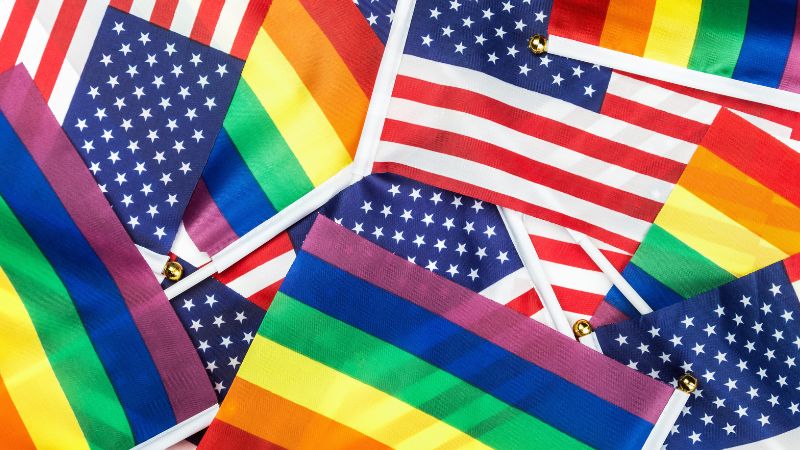A study from the Pew Research Centre has looked at how LGBTQ people feel about how much they are accepted in the US society.
The study comes in the lead up to the USA marking a decade since the landmark Supreme Court decision that allowed marriage equality across the country.
The research showed that gay, lesbian and bisexual were feeling more included and accepted in society, but the same could not be said for people who are transgender or non-binary.

The study has been compared to similar gages of people’s feeling of acceptance and shown a notable change over the last two decades.
In 2004 only 3 per cent of Americans supported marriage equality, while 60% of people described themselves as being opposed to same-sex couples being allowed to wed. By 2015 the numbers had shifted to 55 per cent of people being supportive, and only 39 per cent being opposed. In a 2023 study, eight years after the laws were changed, support had grown to 63 per cent.
The latest research looks at how LGBTQ people themselves are feeling, and it found that 61 per cent of gay or lesbian people felt they felt a great deal of acceptance, while 29 per cent felt some level of acceptance, and only 8 per cent felt no level of acceptance.
The figures for people who are bisexual were also mostly positive with 52 per cent of people saying they felt a great deal of acceptance, and 25 per cent reporting some level of acceptance, with 10 per cent reporting no level of acceptance.
The figures for people who are transgender or non-binary were remarkably different, with on 14 per cent of people who non binary and 13 per cent of people who are transgender reporting that they felt a great deal of acceptance in society. 34 per cent of people who are non-binary, and 31 per cent of people who are transgender reported that they felt some level of acceptance.
Concerningly 52 per cent of people are transgender reported that they felt no level of acceptance, and 44 per cent pf people who are non-binary felt similarly ostracised.
The study involved 3,959 LGBTQ adults and was conducted in January 2025.
The participants in the study said they felt there more acceptance of LGBTQ people now that there was a decade ago, and most felt confident that acceptance would grow in the future.
When asked what would increase acceptance in the future support from religious leaders, LGBTQ people holding positions of prominence in politics and government, celebrities being open about their sexuality, and the inclusion of LGBTQ characters in books, films and television programs were suggested as the pathways. Support for companies and organisations was seen as being a less effective way to promote inclusion.
Most LGBTQ people have been subjected to jokes or slurs about their sexuality or gender
While people were feeling more accepted, they are still being subjected to jokes and slurs about their gender and sexuality.
The majority of gay or lesbian adults (73%) and transgender adults (68%) say they had been subject to slurs or jokes because of their sexual orientation or gender identity. Transgender adults are about twice as likely as gay or lesbian adults to say this has happened to them recently – that is, in the 12 months prior to the survey (42% vs. 22%).
The study also found that 70 per cent of transgender adults say they have feared for their personal safety at some point. About half of gay or lesbian adults (52%) and 28 per cent of bisexual adults said the same.
Among LGBTQ adults overall, 24 per cent say they have received poor service at stores or restaurants, 21 per cent say they have been treated poorly by doctors or nurses, and 19 per cent say they have been treated unfairly by an employer because of their sexual orientation or gender identity.
Transgender adults are more likely than others to say they have been treated poorly by health care professionals (42% vs. 24% of gay or lesbian adults and 16% of bisexual adults).
People reported that they’d been aware of their sexuality and gender from a young age
The survey also asked people how long they felt they’d been aware of their sexuality and gender identity.
71per cent of gay or lesbian adults, 50 pr cent of bisexual adults, and 58 per cent of transgender adults say they were first aware of their identity before age 14. Much smaller shares say they had told someone about it by that age.
The study also found that people are coming out younger, and feeling more confident to share information about their sexuality and gender with friends and family.
Read the full report on the research.




